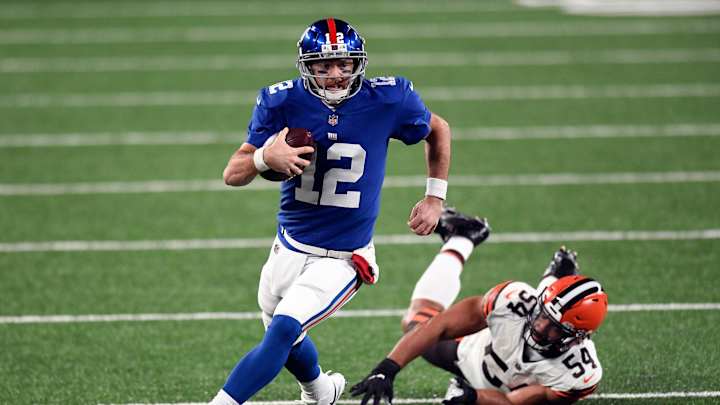Giants Scoring Struggles Underscore Big Problems on Offense

Another week, another offensive struggle for the Giants.
Sunday night's 20-6 loss to the Cleveland Browns marked the fourth straight game in which the Giants' offense failed to exceed 20 points and the eighth time this season.
Even worse, the loss marks the second straight game the offense failed to exceed 10 points after falling 26-7 to the Cardinals last week.
For the Giants, it is the second two-game streak of failing to score 10 points or more dating back to Weeks 3 and 4 (against the 49ers and Rams) in which the Giants only managed nine points.
The Giants had a chance to at least get over the 10-point threshold but were unable to capitalize on a pair of red-zone trips in the first half. Head coach Joe Judge decided to be overly aggressive and call for a fake field goal in the first trip and then go for it on fourth down on the second.
"Field goals weren't going to win this game," Judge said. "I'm not afraid to call things aggressively. I'm not afraid if I think we have a good scheme in the kicking game to call a fake. I'm not afraid to run the ball on fourth-and-one.
"I thought it was a well-designed fake. We've executed and practiced that consistently throughout the year. I thought the timing was right. You look to go ahead and just roll the dice sometimes and take a chance. You hit that thing, you're the guru. You don't hit that thing, everyone wants to second-guess your decision."
Judge has a point in that if the Giants are successful on those two plays, then he's hailed as the next coaching genius. But beyond those two instances, there were other missed opportunities--a dropped deep ball by receiver Darius Slayton and quarterback Colt McCoy's underthrowing tight end Evan Engram in the endzone are two that stand out as being "what if?" moments."
"We’ve just got to execute. I love the fact that [Head] Coach [Joe Judge] has the confidence in us to go for those situations that we got into. We’ve just got to execute and come away with points, it’s as simple as that," said receiver Sterling Shepard.
Shepard bristled when it was suggested that the receivers haven't been separating this year.
"I don’t know where people are getting that from, to be honest," he said, showing a rare sign of being irked. "Is that what you’re saying? That we’re getting, what, two yards of separation? In the NFL, that’s open. I don’t know what the analytics say, but you can go off that if you want to. I know what I see on film and for those of them who think that way, go look at the film."
The Giants' recent offensive skid is a clear sign of offensive regression in the offense and a concerning way to close out a season in which progress and improvement were meant to be the leading priorities.
In fairness, the Giants were without quarterback Daniel Jones, sidelined by hamstring and ankle injuries. And as the Giants did when Jones had to miss the game against Seattle, they turned to McCoy to pretty much manage the game, all the while hoping to get the running game going to build some momentum.
But a new wrinkle this week was that offensive coordinator Jason Garrett was home recovering from the COVID-19 virus, leaving the play-calling in the hands of tight ends coach Freddie Kitchens.
"[The offensive game plan] didn't change much as far as the plays we would've run with [Offensive Coordinator] Jason [Garrett]," McCoy said. "The communication was good. I think my frustration lies in we have to be better in the red zone. That's the bottom line, and I think I can do a much better job, but collectively as a group, we've got to figure it out when we get down there.
McCoy went from being a game manager in the Giants' 17-12 victory against the Seahawks in Week 13 to be the team's primary offensive catalyst as a passer on Sunday. He threw 31 passes against the Browns, the most he's thrown in a game since November of 2018.
McCoy completed 19 of those passes for 221 yards, and while he didn't turn the ball over, he failed to lead a touchdown drive and achieved just a 45% efficiency on third down.
"I think when our defense holds an offense like that to 20 points we've got to pull our side of the ball, we've got to score some points," McCoy said. "That's my frustration is we didn't do enough down in the red zone. A lot of that's on me and I've got to be more detailed, I've got to be better down there."
